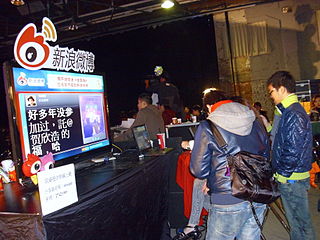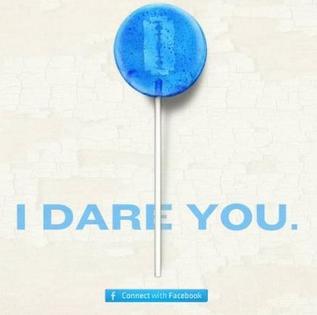Related Research Articles
Viral marketing is a business strategy that uses existing social networks to promote a product mainly on various social media platforms. Its name refers to how consumers spread information about a product with other people, much in the same way that a virus spreads from one person to another. It can be delivered by word of mouth, or enhanced by the network effects of the Internet and mobile networks.

Christopher John Grace is an American actor. He is known for portraying Eric Forman in the Fox sitcoms That '70s Show and That '90s Show, Eddie Brock / Venom in Sam Raimi's film Spider-Man 3, Pete Monash in Win a Date with Tad Hamilton!, Carter Duryea in In Good Company, Edwin in Predators, Getty in Interstellar, Adrian Yates in American Ultra, and David Duke in Spike Lee's film BlacKkKlansman. His other film roles include Traffic, Mona Lisa Smile, Valentine's Day, Take Me Home Tonight, The Big Wedding, War Machine, Breakthrough, and Irresistible. He currently stars as Tom Hayworth in the comedy series Home Economics.

Emmanuelle Grey Rossum is an American actress, director, and singer. She is known for her portrayal of Fiona Gallagher in the television series Shameless (2011–2019). Since the mid-2010s, she has also directed and produced television, including the 2022 Peacock series Angelyne in which she also stars.

Henry Jenkins III is an American media scholar and Provost Professor of Communication, Journalism, and Cinematic Arts, a joint professorship at the University of Southern California (USC) Annenberg School for Communication and Journalism and the USC School of Cinematic Arts. He also has a joint faculty appointment with the USC Rossier School of Education. Previously, Jenkins was the Peter de Florez Professor of Humanities as well as co-founder and co-director of the Comparative Media Studies program at the Massachusetts Institute of Technology (MIT). He has also served on the technical advisory board at ZeniMax Media, parent company of video game publisher Bethesda Softworks. In 2013, he was appointed to the board that selects the prestigious Peabody Award winners.

Marc Scarpa is an American entrepreneur, producer and director specializing in live participatory media. He is the executive board member and the founding New York Chair of the Producers Guild of America New Media Council and a recipient of the Marc A. Levey distinguished service award. Scarpa has received a Webby Award in 2010 for Best Event / Live Webcast for his work on the 52nd Annual Grammy Awards, a Cannes Bronze Lion for Branded Content and Entertainment for the X Factor Pepsi Digital Preshow and Xtra Factor App and four Social TV Awards including Best of Show for X Factor Pepsi Digital Preshow and Xtra Factor App. Additionally, he has been a panelist for conferences such as NATPE, X-Summit, LTE North America, Digital Hollywood and Canadian Music Week among others.
Engagement marketing, sometimes called "experiential marketing", "event marketing", "on-ground marketing", "live marketing", "participation marketing", "Loyalty Marketing", or "special events", is a marketing strategy that directly engages consumers and invites and encourages them to participate in the evolution of a brand or a brand experience. Rather than looking at consumers as passive receivers of messages, engagement marketers believe that consumers should be actively involved in the production and co-creation of marketing programs, developing a relationship with the brand.
Social television is the union of television and social media. Millions of people now share their TV experience with other viewers on social media such as Twitter and Facebook using smartphones and tablets. TV networks and rights holders are increasingly sharing video clips on social platforms to monetise engagement and drive tune-in.

Dollhouse is an American science fiction television series created by writer and director Joss Whedon under Mutant Enemy Productions. It premiered on February 13, 2009, on the Fox network and was canceled on November 11, 2009. The final episode aired on January 29, 2010. Production wrapped in December 2009, with a total of 27 episodes produced including the original pilot.
An Internet celebrity is a celebrity who has acquired or developed their fame and notability on the Internet. The rise of social media has helped people increase their outreach to a global audience. Today, internet celebrities are found on popular online platforms such as Facebook, YouTube, Instagram, WeChat, TikTok, QQ, Snapchat, Telegram, Twitter, and Reddit.

Social media marketing is the use of social media platforms and websites to promote a product or service. Although the terms e-marketing and digital marketing are still dominant in academia, social media marketing is becoming more popular for both practitioners and researchers. Most social media platforms have built-in data analytics tools, enabling companies to track the progress, success, and engagement of ad campaigns. Companies address a range of stakeholders through social media marketing, including current and potential customers, current and potential employees, journalists, bloggers, and the general public. On a strategic level, social media marketing includes the management of a marketing campaign, governance, setting the scope and the establishment of a firm's desired social media "culture" and "tone."

Drake Doremus is an American film director, screenwriter and producer best known for directing the films Like Crazy (2011), which won the Grand Jury Prize at the 2011 Sundance Film Festival, Douchebag (2010) which was in Dramatic competition at the 2010 Sundance Film Festival, and Equals (2015).

Inside is a 2011 American social horror thriller film brought to viewers through a partnership between Intel and Toshiba.

Social media and television have a number of connections and interrelationships that have led to the phenomenon of Social Television, which is an emerging communication digital technology that centers around real-time interactivity involving digital media displayed on television. The main idea behind Social Television is to make television consumption a more active content experience for audiences. In the 2010s, social media platforms and websites allow for television shows to be accessed online on a range of desktop and mobile computer devices, smartphones and smart TVs that are still evolving today in the 2020s. Alongside this, online users can use social media websites to share digital video clips or excerpts from TV shows with fellow fans or even share an entire show online. Many social media websites enable users to post online comments on the programs—both negative and positive—in a variety of ways. Viewers can actively participate while watching a TV program by posting comments online, and have their interactions viewed and responded to in real time by other viewers. Technologies such as smartphones, tablets, and laptop computers allow viewers to watch downloaded digital files of TV shows or "stream" digital files of TV shows on a range of devices, both in the home and while on the go. In the 2020s, many television producers and broadcasters encourage active social media participation by viewers by posting "hashtags" on the TV screen during shows; these hashtags enable viewers to post online comments about the show, which may either be read by other social media users, or even, in some cases, displayed on the screen during the show.

Take This Lollipop is a 2011 interactive horror short film and Facebook app written and directed by Jason Zada. Developer Jason Nickel used Facebook Connect to bring viewers themselves into the film, through use of pictures and messages from their own Facebook profiles. Starring actor Bill Oberst Jr. as 'The Facebook Stalker', the film acts to personalize and underscore the dangers inherent in posting too much personal information about oneself on the internet. The information gathered from a viewer's Facebook profile by the film's app is used once and then deleted. The title is derived from the 1963 song "Please Little Girl Take This Lollipop", written and performed by singer-songwriter Bobby Jameson, which is used in the film.
Jason Zada is an American film director, music video director, screenwriter and digital marketeer, best known for Elf Yourself, an interactive viral holiday season campaign for OfficeMax, and for Take This Lollipop, an interactive horror short film created to raise awareness of the danger of placing too much personal information online.

The Beauty Inside is a 2012 social Internet series developed by Intel and Toshiba, directed by Drake Doremus, written by Richard Greenberg, and starring Topher Grace, Mary Elizabeth Winstead, and Matthew Gray Gubler.

The Power Inside is a 2013 comedy social film developed by Intel and Toshiba. It is Intel and Toshiba's third social film after The Beauty Inside (2012) and Inside (2011). Directed by Will Speck and Josh Gordon and starring Harvey Keitel, Analeigh Tipton, and Craig Roberts, the film is broken up into six filmed episodes interspersed with interactive storytelling that all takes place on the main character's Facebook timeline.
Viral phenomena or viral sensation are objects or patterns that are able to replicate themselves or convert other objects into copies of themselves when these objects are exposed to them. Analogous to the way in which viruses propagate, the term viral pertains to a video, image, or written content spreading to numerous online users within a short time period. This concept has become a common way to describe how thoughts, information, and trends move into and through a human population.

Inside Films is a joint effort between Intel and Toshiba that focuses on creating social films. Founded in 2011, Inside Films has produced three social productions spanning three different genres.
Social media reach is a media analytics metric that refers to the number of users who have come across a particular content on a social platform such as Facebook, Instagram or Twitter. Social media platforms including Facebook, Twitter, YouTube, Instagram, Spotify and many more have their own individual ways of tracking, analyzing and reporting the traffic on each of the individual platforms. Each platform allows their users, from everyday citizens to public figures and companies, to create posts and content, to be active on the platform and to interact with other users. These platforms are also a main source of communication between companies and their target audiences. By conducting research, companies are able to utilize analytical information, such as the reach of their posts, to better understand the interactions between the users and their content.
References
- ↑ Guest Post: Hal Siegel “My Film Has a Virus? WTF?” > Hope for Film
- ↑ Him, Her and Them — The First Ever Facebook Film | The Creators Project
- ↑ Inside Intel And Toshiba's Social Film | Fast Company
- ↑ "DIRECTOR DRAKE DOREMUS SEEKS "THE BEAUTY INSIDE" FOR TOSHIBA AND INTEL". Fast Company.
- ↑ "Another Social Film Experience". Creativity Online.
- ↑ "Topher Grace to Star in Intel and Toshiba's Social Film". Mashable.
- ↑ "INTEL AND TOSHIBA TEAM UP FOR SECOND SOCIAL FILM PROJECT, "THE BEAUTY INSIDE"". AdAge.